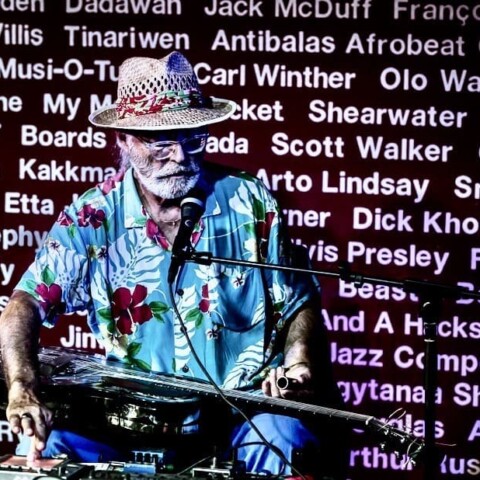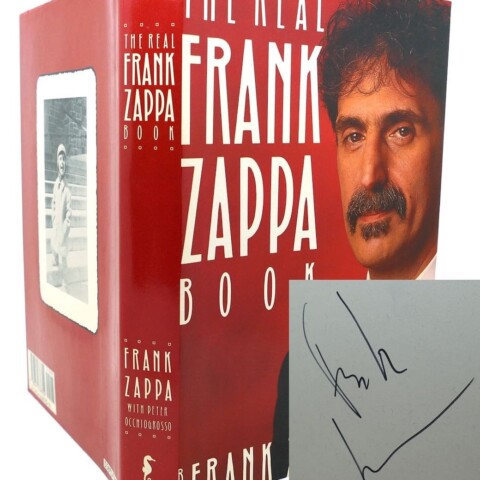Okay, so it’s really, really depressing, but Werner Herzog’s Stroszek is one of the best films ever made. And a lot of that has to do with the music. IAN CURTIS HUNG himself straight after watching Stroszek, a movie that’s so utterly numbing in its portrayal of the disintegration of the hopes and dreams of its hero that it makes the Joy Division singer’s lyrics of deject hopelessness sound almost fanciful. And yet to me, there’s something warm and reassuring about the film. So great is Stroszek that, over time, I’ve repeatedly dipped into the bulging filmography of writer/director Werner Herzog, in the hope of finding another film as complete and as perfect. What was I thinking? Of course it’s one-of-a-kind! The vast majority of Herzog’s other films of the 1970s are disappointing in various ways: while they clearly take a dim view of humanity, unlike Stroszek they lack heart, and too often they obscure the point with needless obfuscation, making for pretentious and ultimately boring art films. Try sitting through Even Dwarfs Started Small (which only features little people, on a rampage against something-or-other) or Heart Of Glass (in which the whole cast are hypnotised, and predictably, act like zombies) without feeling like you’ve been robbed of your precious life force. And then there are the megalomaniac jungle epics that made Herzog infamous, Aquirre, The Wrath Of God, and Fitzcarraldo. (Les Blank’s documentary about the making of that film, Burden Of Dreams, is way more entertaining than the film its about).
And yet to me, there’s something warm and reassuring about the film. So great is Stroszek that, over time, I’ve repeatedly dipped into the bulging filmography of writer/director Werner Herzog, in the hope of finding another film as complete and as perfect. What was I thinking? Of course it’s one-of-a-kind! The vast majority of Herzog’s other films of the 1970s are disappointing in various ways: while they clearly take a dim view of humanity, unlike Stroszek they lack heart, and too often they obscure the point with needless obfuscation, making for pretentious and ultimately boring art films. Try sitting through Even Dwarfs Started Small (which only features little people, on a rampage against something-or-other) or Heart Of Glass (in which the whole cast are hypnotised, and predictably, act like zombies) without feeling like you’ve been robbed of your precious life force. And then there are the megalomaniac jungle epics that made Herzog infamous, Aquirre, The Wrath Of God, and Fitzcarraldo. (Les Blank’s documentary about the making of that film, Burden Of Dreams, is way more entertaining than the film its about).  It’s not that Werner Herzog’s films don’t have merit, however. For all their – and his – flaws, Herzog is a fascinating character precisely because he’s a waywardly individualistic intellectual auteur – one who is interested in the psychogeography of human behaviour. You don’t get that a lot in the compromised world of cinema. Stroszek, though, is a film with few flaws, and its documentary-style telling of the story of one of life’s underdogs gets its power partly from its simplicity. Herzog chose a real-life underdog for the main role, a man who had been beaten to within an inch of his life as a baby by his prostitute mother, rejected, and grew up in institutions that considered him brain-damaged. Bruno S, who starred in two of Herzog’s movies before going back to an itinerant life in Germany, can’t act to save himself, but that’s the point. Bruno is always just Bruno. In Stroszek, he plays a character very similar to himself, a hopeless underdog who tries to protect a prostitute from some criminal bullies. When the prostitute, Eva, is repeatedly beaten up, and Bruno’s lodgings are trashed, they travel with a friend to start a new life in America, land of milk and honey and endless opportunity. Except it’s not New York or LA, but freezing cold Wisconsin, a barren landscape where their support network consists of their elderly friend’s moronic mechanic uncle, and his American Indian assistant.
It’s not that Werner Herzog’s films don’t have merit, however. For all their – and his – flaws, Herzog is a fascinating character precisely because he’s a waywardly individualistic intellectual auteur – one who is interested in the psychogeography of human behaviour. You don’t get that a lot in the compromised world of cinema. Stroszek, though, is a film with few flaws, and its documentary-style telling of the story of one of life’s underdogs gets its power partly from its simplicity. Herzog chose a real-life underdog for the main role, a man who had been beaten to within an inch of his life as a baby by his prostitute mother, rejected, and grew up in institutions that considered him brain-damaged. Bruno S, who starred in two of Herzog’s movies before going back to an itinerant life in Germany, can’t act to save himself, but that’s the point. Bruno is always just Bruno. In Stroszek, he plays a character very similar to himself, a hopeless underdog who tries to protect a prostitute from some criminal bullies. When the prostitute, Eva, is repeatedly beaten up, and Bruno’s lodgings are trashed, they travel with a friend to start a new life in America, land of milk and honey and endless opportunity. Except it’s not New York or LA, but freezing cold Wisconsin, a barren landscape where their support network consists of their elderly friend’s moronic mechanic uncle, and his American Indian assistant.  Their piece of the American dream is a mobile home, but with an air of inevitability it all leads to a sticky conclusion, in which Eva runs off with some truckers, and Bruno and his dilapidated old friend make a truly pathetic attempt to rob a bank. It’s the last 15 minutes that plays out like no other film, and stays in the mind, niggling away like a rat biting off its own leg to get out of the trap. But we’ll get to that in a minute. You see, the reason I’m writing about Stroszek isn’t my attempt at a belated review of the movie, but to posit the opinion that one of the key – make that essential – ingredients of the film is the music Herzog chose to accompany the images. Surprisingly, this time he doesn’t utilise the talents of Popol Vuh, who were responsible for incredible soundtracks to many of his films. Instead, he’s done a Kenneth Anger/Quentin Tarantino, and at judicious moments he drops in the most exquisite, perfectly apt songs. Much of the film is without any score whatsoever, but when a song is used, it’s used with killer instinct for maximum emotional impact. What’s more, the specific emotional gravity of the songs sometimes even work in contrast against what’s happening in the movie.
Their piece of the American dream is a mobile home, but with an air of inevitability it all leads to a sticky conclusion, in which Eva runs off with some truckers, and Bruno and his dilapidated old friend make a truly pathetic attempt to rob a bank. It’s the last 15 minutes that plays out like no other film, and stays in the mind, niggling away like a rat biting off its own leg to get out of the trap. But we’ll get to that in a minute. You see, the reason I’m writing about Stroszek isn’t my attempt at a belated review of the movie, but to posit the opinion that one of the key – make that essential – ingredients of the film is the music Herzog chose to accompany the images. Surprisingly, this time he doesn’t utilise the talents of Popol Vuh, who were responsible for incredible soundtracks to many of his films. Instead, he’s done a Kenneth Anger/Quentin Tarantino, and at judicious moments he drops in the most exquisite, perfectly apt songs. Much of the film is without any score whatsoever, but when a song is used, it’s used with killer instinct for maximum emotional impact. What’s more, the specific emotional gravity of the songs sometimes even work in contrast against what’s happening in the movie.  For instance, Chet Atkins’ easy listening guitar-pickin’ instrumental version of ‘By The Time I Get To Phoenix’ is used when the German trio first arrive in America with a genuine sense of hope, but later, when all is lost, the same tune is used again, bringing out the latent melancholy and hopelessness in the recording. (The second time it’s fused with ‘Last Thing On My Mind’).
For instance, Chet Atkins’ easy listening guitar-pickin’ instrumental version of ‘By The Time I Get To Phoenix’ is used when the German trio first arrive in America with a genuine sense of hope, but later, when all is lost, the same tune is used again, bringing out the latent melancholy and hopelessness in the recording. (The second time it’s fused with ‘Last Thing On My Mind’).
 burning truck at a depressing ‘Red Indian’ tourist stop, and enters an amusement gallery where real animals toil for laughs when dimes are inserted in the machinery. The dancing chicken (amongst other animals) is one of those images you simply can’t erase from the memory, and the way Herzog achieves an incredible pitch of emotional gravity through the enforced chicken dance, and the amusement gallery’s musical monotony overlaid with Sonny Terry’s whooping and hollering, is nothing short of genius. If only Ian Curtis hadn’t taken this movie, and this scene in particular, at face value. Sure, the message is bleak, and the film navigates its chosen territory unflinchingly, and that is depressing. But that’s what art does – it interrogates the interior, the map of the human heart. The picture isn’t pretty, but at least knowing about something is the next best step to doing something about it. John Waters recently talked about how “outsider art” had entered the mainstream, making the whole point of being an outsider irrelevant. If anything, Stroszek is a plea to care for society’s outsiders and outcasts; a rumination on circumstance and society and how hard it is, when you’re on the bottom of the ladder, to get any kind of foot-hold. It’s a deeply humanistic film, and it should be part of every school curriculum. GARY STEEL
burning truck at a depressing ‘Red Indian’ tourist stop, and enters an amusement gallery where real animals toil for laughs when dimes are inserted in the machinery. The dancing chicken (amongst other animals) is one of those images you simply can’t erase from the memory, and the way Herzog achieves an incredible pitch of emotional gravity through the enforced chicken dance, and the amusement gallery’s musical monotony overlaid with Sonny Terry’s whooping and hollering, is nothing short of genius. If only Ian Curtis hadn’t taken this movie, and this scene in particular, at face value. Sure, the message is bleak, and the film navigates its chosen territory unflinchingly, and that is depressing. But that’s what art does – it interrogates the interior, the map of the human heart. The picture isn’t pretty, but at least knowing about something is the next best step to doing something about it. John Waters recently talked about how “outsider art” had entered the mainstream, making the whole point of being an outsider irrelevant. If anything, Stroszek is a plea to care for society’s outsiders and outcasts; a rumination on circumstance and society and how hard it is, when you’re on the bottom of the ladder, to get any kind of foot-hold. It’s a deeply humanistic film, and it should be part of every school curriculum. GARY STEEL















Yep it is hanged but it doesn’t ring like hung and JL knew that.
SB used hung in his first volkner yarn (SST Sunday Mag) so you are in good company.
Hi – the use of music in The Enigma of Kaspar Hauser is also worthy of comment ? And by extension the acting / direction and associated metaphysicals… ? thanks Dan